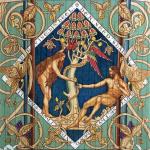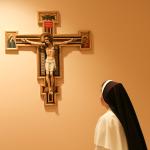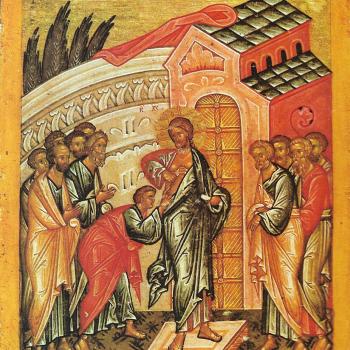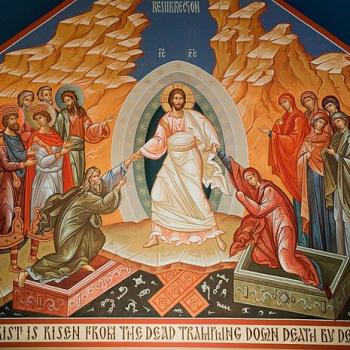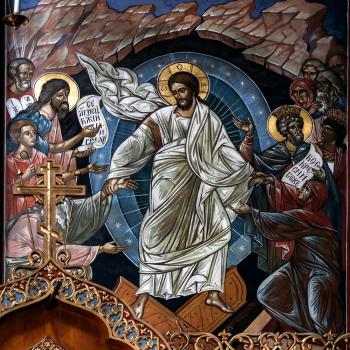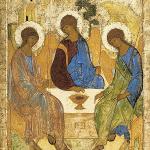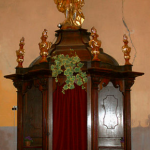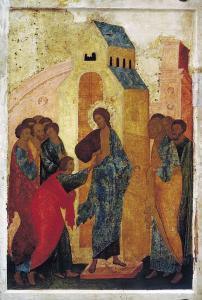
The Sabbath is the seventh day of the week, the day of rest. The next day, Sunday, begins a new week; it is the first day of something new. If, however, we continue to count the days based upon the previous week, we would find the day after the Sabbath would be the eighth day. Thus, the first day of the week, Sunday, can also be described as the eighth day. It is the beginning of something new, even as it continues from what came before it. When we call it the eighth day, we point its transcendent nature, because a week has seven days. Pascha, Easter, is said to occur on the eighth day for this reason: it is the day after the Sabbath, the glorious eighth day which comes after the Sabbath rest. Christ’s resurrection from the dead brings with it all that came before it, transforming everything into something new, something greater than it ever was before. But the new day is not like any other day. It is the eternal, everlasting day. Everything which came before it, all temporal creation, is brought into it to realize its eternal fulfillment.
Every eight days, every Sunday, symbolically represents the same thing. Every week there is a Sabbath rest. And then, every week, we come to the day after the Sabbath rest, Sunday, celebrating on it the glorious resurrection which occurred on the eighth day. This is represented in the tradition whereby Thomas’ encounter with the resurrected Christ is remembered the Sunday after Easter. We find we find eight days after Pascha the celebration of Pascha is repeated and doubled, which it seems why it is appropriate that this is presented to us by use of Thomas, “the twin”:
Now Thomas, one of the twelve, called the Twin, was not with them when Jesus came. So the other disciples told him, “We have seen the Lord.” But he said to them, “Unless I see in his hands the print of the nails, and place my finger in the mark of the nails, and place my hand in his side, I will not believe.” Eight days later, his disciples were again in the house, and Thomas was with them. The doors were shut, but Jesus came and stood among them, and said, “Peace be with you.” Then he said to Thomas, “Put your finger here, and see my hands; and put out your hand, and place it in my side; do not be faithless, but believing.” Thomas answered him, “My Lord and my God!” Jesus said to him, “Have you believed because you have seen me? Blessed are those who have not seen and yet believe.” (Jn. 2-24-29 RSV).
The Paschal event happened at a particular time and place, but also it transcends time and space. Time finds itself oriented by eternity, and so what happens in time finds itself centered upon the eternal activity of God. As Jesus is the God-man, Jesus is the bridge which brings them together, for Jesus is both God and man. The Paschal event is a temporal event due to Jesus’ humanity even as it is an eternal event due to Jesus’ divinity. The two are one because Jesus is one, that is, eternity and time are made one in Jesus, and so what happens to Jesus is both a temporal event and an eternal event. And it is because of this, because of the eternalization of the event, even if we do not live in the time of the historical Jesus, we have a way to connect to the experience of that event, to realize it in our own lives.
We are called to participate in the experience of the resurrection. By having Thomas’ encounter with the resurrected Christ commemorated on the eighth day after Easter Sunday, we are shown how this happened even for Thomas. He was brought to the Paschal celebration later than the rest of Jesus’ inner circle, and yet he became one of its witnesses, even as we, so much later, can be brought into it and become one of its witnesses as well. It can therefore be said that the story of Thomas and his way of being brought into the Paschal event is, in a way, our story. It is the story of how people can come to the Paschal event for themselves, to find that the Paschal event, thanks to its eternal side, continues throughout all time. Each person does so in their own unique way. While Thomas was called to specifically touch Christ’s wounds, we can touch Christ in and through his real presence in the eucharist, for in communion, we can unite ourselves with Jesus and receive our share of the resurrected glory. But, so long as we remain in time, we not only can partake of the event once, we can do so many times, each time, finding new graces coming to us, as we find ourselves touching eternity from many different points in time. Thus, even if it often seems that we are doing the same thing over and over again, Sunday after Sunday, eighth day after eighth day, we must realize that we do so each time in a unique way, some which will prove more meaningful to us than others. This is not because the root event, the eternal Paschal event, has changed, but because, we change, and with our change, we can re-encounter the event and get something new from it. The more we participate in it, the more we will find ourselves drawn beyond time so that in the end, we will find ourselves fully drawn into eternity, experiencing the glory which comes from it as the eternal glory of the kingdom of God.
While we could explore the story of how Thomas encountered the resurrected Christ, and try to determine how much of it is historical, how much of it was merely symbolic, this kind of discussion is beside the point in relation to the liturgical commemoration of Thomas’ encounter with the resurrection Christ. The event as it is described is full of symbolism which points us to our own encounter with the resurrected Christ. We can and should participate in the continuing, eternal event of the resurrection. We are called to open ourselves up in faith and receive the glorified Christ into our lives. This is why the church shares communion. It provides us a chance to partake of the glorified Christ, receiving him into ourselves, giving thanks when we do so. We should see all things made new. We should see how the glorified Christ brings grace and love to all. Our sins are forgiven, indeed, they are shown to be nothing – Jesus is risen! Death itself has no hold over Jesus. When we join ourselves to him, when we allow him to enter us even as we enter him, we will find that death has no final hold over us. What we experience in time, in our own doubling of the Paschal celebration, is just a foreshadowing of what it is we will grasp in eternal life – but only if we open ourselves to that glory, to the love of God and the grace which comes out of that love. We, then, are called to share in the glory given to the Apostles. We are to find ourselves becoming a part of the great story. We have a place in its telling, and indeed, our lives can find ourselves represented in its retelling. We have our place in the kingdom of God. The eighth day continues to be celebrated and encountered again and again; each time it is celebrated, it gives up some more of its mysteries, giving up its graces, meaning, each time it is encountered, something new can be discovered. After all, the way Jesus met with Thomas, the twin, was different from the way he met with the rest of the Apostles.
Stay in touch! Like A Little Bit of Nothing on Facebook.
If you liked what you read, please consider sharing it with your friends and family!
N.B.: While I read comments to moderate them, I rarely respond to them. If I don’t respond to your comment directly, don’t assume I am unthankful for it. I appreciate it. But I want readers to feel free to ask questions, and hopefully, dialogue with each other. I have shared what I wanted to say, though some responses will get a brief reply by me, or, if I find it interesting and something I can engage fully, as the foundation for another post. I have had many posts inspired or improved upon thanks to my readers.


